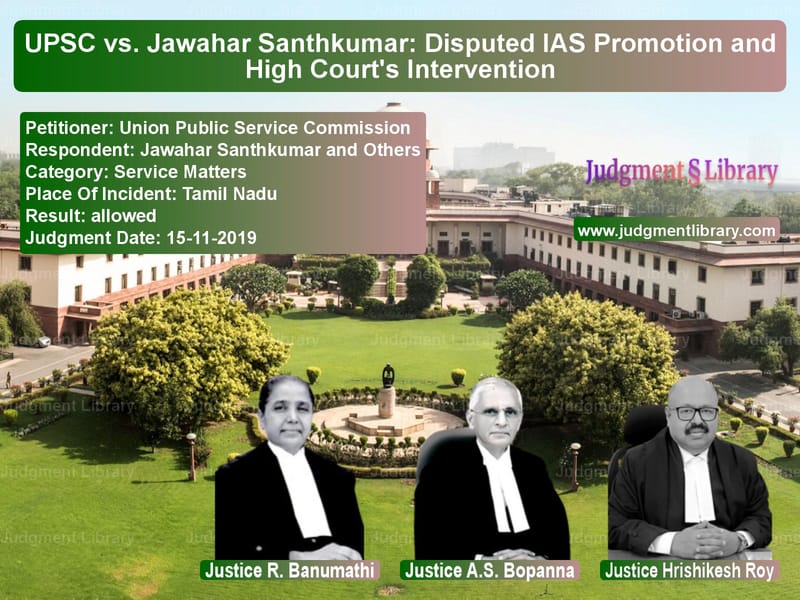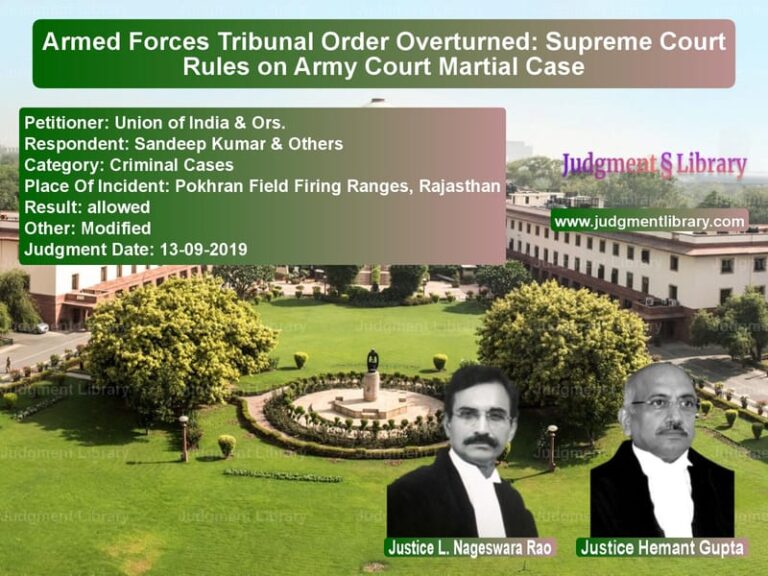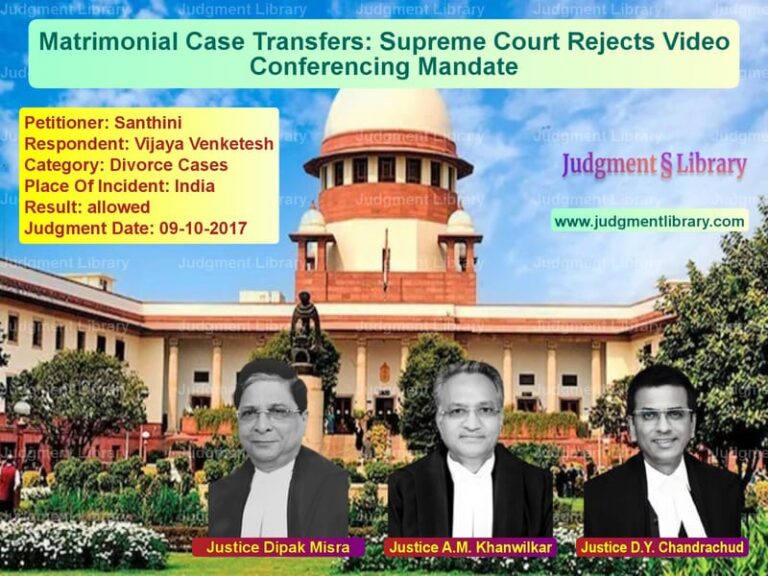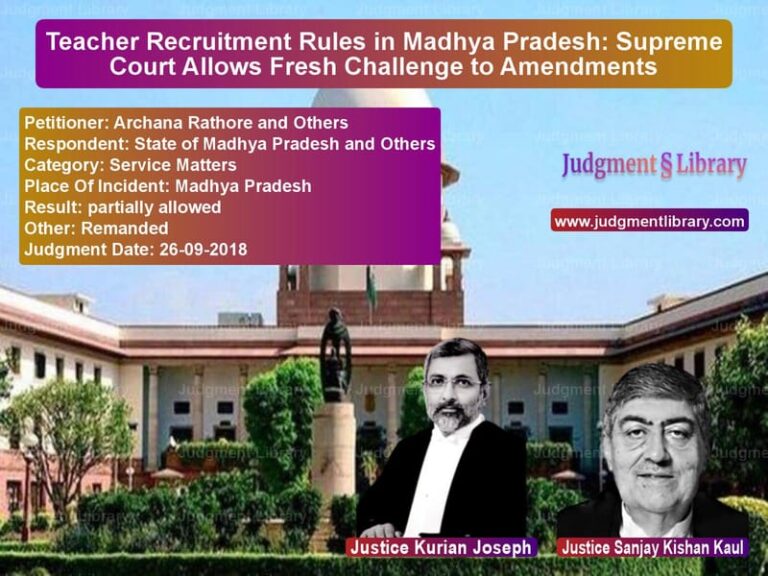UPSC vs. Jawahar Santhkumar: Disputed IAS Promotion and High Court’s Intervention
The case of Union Public Service Commission (UPSC) vs. Jawahar Santhkumar and Others revolves around a promotion dispute concerning the Indian Administrative Service (IAS). The key issue was whether the High Court was justified in directing a review of promotions for the year 2004, ensuring the first respondent’s inclusion. This case involved multiple legal principles, including seniority, merit-based selection, and procedural fairness.
The matter originated when the first respondent, Jawahar Santhkumar, was denied promotion to the IAS in 2004. The Selection Committee assessed him as ‘Good,’ whereas his juniors were rated ‘Very Good’ and consequently promoted. Santhkumar contested this decision before the Central Administrative Tribunal (CAT), which upheld the Selection Committee’s decision. Dissatisfied, he approached the Madras High Court, which ruled in his favor, directing a review of the selection process.
Background and Legal Proceedings
A Selection Committee met on December 18, 2004, to assess candidates for IAS promotion from the Tamil Nadu cadre. The first respondent’s assessment was lower compared to the officers ultimately selected. Aggrieved, he filed an application with CAT, arguing that his assessment had been unfairly downgraded and that he should have been promoted alongside his juniors.
CAT dismissed his application, reasoning that the Selection Committee had lawfully conducted its assessment. Subsequently, his review petition was also dismissed. The respondent then filed a writ petition before the Madras High Court.
High Court’s Decision
The High Court ruled that the delayed fixation of the first respondent’s seniority had prejudiced his case. It noted inconsistencies in the Selection Committee’s evaluation, particularly regarding another officer, T.K. Ponnusamy, who was initially deemed ‘Unfit’ in 2003 but was later rated ‘Very Good’ in 2004. The court held that the sudden hike in Ponnusamy’s rating and the unexplained downgrading of Santhkumar indicated an arbitrary process.
Consequently, the High Court directed a review of the selection process and ordered Santhkumar’s promotion to IAS from the date his juniors were promoted.
Arguments by the UPSC and State of Tamil Nadu
The UPSC and the State of Tamil Nadu challenged the High Court’s decision, arguing:
- Seniority alone does not entitle an officer to promotion; merit, ability, and suitability take precedence.
- The Selection Committee is empowered to make independent assessments based on service records.
- Judicial intervention in merit-based selection should be limited unless there is clear evidence of bias or procedural irregularity.
- Inclusion of an officer with pending criminal cases (T.K. Ponnusamy) was provisional, subject to clearance.
Supreme Court’s Judgment
The Supreme Court overturned the High Court’s ruling, reaffirming the principle that promotions to IAS are determined by merit rather than seniority. The court observed:
“The Selection Committee consists of experts in the field. When a high-level committee or an expert body has considered the merit of candidates, courts should not act as an appellate authority to reassess the selection.”
The court held that the High Court overstepped its jurisdiction by questioning the Selection Committee’s subjective assessment. The judicial review of selection decisions should be limited to cases of arbitrariness, mala fide intent, or procedural violations. The Supreme Court emphasized that:
“The Selection Committee has the discretion to classify officers as ‘Outstanding,’ ‘Very Good,’ ‘Good,’ or ‘Unfit.’ This classification is incidental to the selection process and need not align with past ACR gradings.”
Furthermore, the Supreme Court found no procedural irregularities in the assessment process, stating that the Selection Committee acted within the framework of the IAS (Appointment by Promotion) Regulations, 1955. The judgment emphasized that:
- The committee had the authority to assign classifications independent of past annual confidential reports (ACRs).
- Santhkumar’s claim that his seniority alone should have secured his promotion was incorrect since the promotion process prioritizes merit.
- The committee’s decision to provisionally include Ponnusamy was legally valid and did not justify reconsideration of Santhkumar’s case.
Conclusion
The Supreme Court’s ruling reaffirmed the autonomy of expert selection bodies and restricted judicial interference in administrative decision-making unless there is clear evidence of bias or illegality. The appeal by UPSC and the State of Tamil Nadu was allowed, and the High Court’s decision was set aside.
Petitioner Name: Union Public Service Commission.Respondent Name: Jawahar Santhkumar and Others.Judgment By: Justice R. Banumathi, Justice A.S. Bopanna, Justice Hrishikesh Roy.Place Of Incident: Tamil Nadu.Judgment Date: 15-11-2019.
Don’t miss out on the full details! Download the complete judgment in PDF format below and gain valuable insights instantly!
Download Judgment: Union Public Service vs Jawahar Santhkumar a Supreme Court of India Judgment Dated 15-11-2019.pdf
Direct Downlaod Judgment: Direct downlaod this Judgment
See all petitions in Promotion Cases
See all petitions in Recruitment Policies
See all petitions in Public Sector Employees
See all petitions in Judgment by R. Banumathi
See all petitions in Judgment by A. S. Bopanna
See all petitions in Judgment by Hrishikesh Roy
See all petitions in allowed
See all petitions in supreme court of India judgments November 2019
See all petitions in 2019 judgments
See all posts in Service Matters Category
See all allowed petitions in Service Matters Category
See all Dismissed petitions in Service Matters Category
See all partially allowed petitions in Service Matters Category







